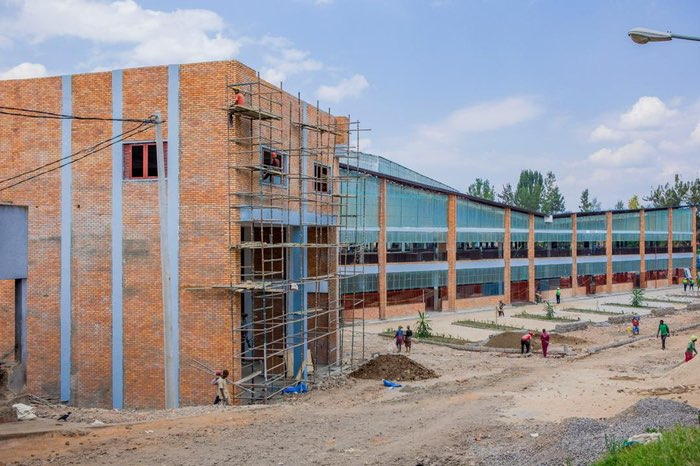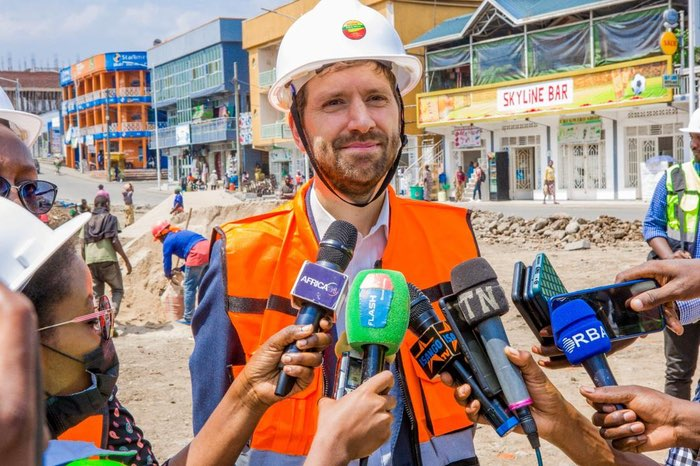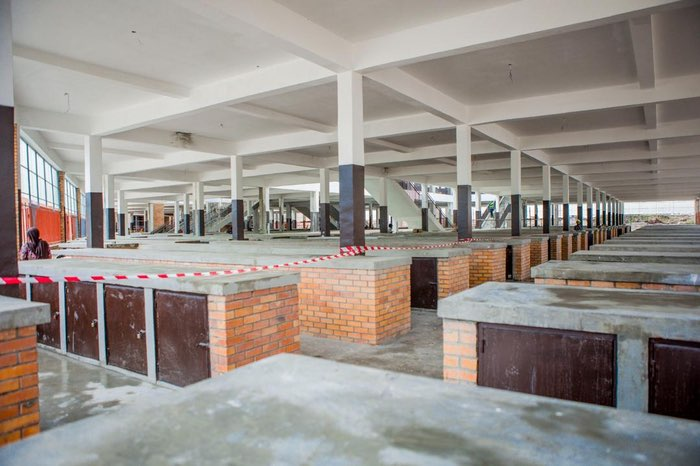
Vendors in Musanze District are now breathing a sigh of relief after the new modernized market built under the Urban Economic Development initiative (UEDi), a project funded by the Belgian Government is accomplished and soon set to be occupied by 2066 tenants.
The market rebuilt in the heart of Musanze City had been operating since 2006 but in a congested area with roof leakages and poor management of waste water and inadequate toilet facilities as well as poor solid waste management.

However, with the new furnished market, the vendors especially those selling vegetables and cereals, starchy foods, flour, meat and fish and poultry products, restaurants and shops and coals will be able to sell their products in a fully-fledged modernized market.
The market which costed FRW 3 billion fund from the Belgian development agency, Enabel, is furnished with modern installations such as storages and waste storage treatment plant, tank for collecting rain water, toilets, firefighting system.
According to the Head of Cooperation at the Embassy of Belgium in Rwanda, Laurent Preud’homme, Rwanda is one of the partners of the development cooperation of Belgium and that the core principle of Belgium is always to make sure the cooperation programmes are aligned with national and local priorities.

“Rwanda has Vision 2050 and NST1 and we can just work under those priorities, that’s why we do this in different sectors in agriculture and urbanization. And in urbanization, it’s not only about buildings but creating the whole eco-system which can provide some amazing health services or business services and skills development and stimulation of entrepreneurship and support local value chain”, he said.
“It doesn’t stop with construction but the whole creation of ecosystem because once this is setup it serves as an example sometimes for other districts. But the ownership gets back to the beneficiaries so we saw it in different districts where the Agaciro was setup. That’s point of the whole intervention. It’s not about what we see today it’s about what we create for the very long-term for the prosperity of the Rwandan people”, he added on.
Asked whether the Belgian Government is planning to stop funding development activities in Rwanda with end of tenure, the Belgian diplomat said that “There are no plans of stopping activities for any time soon”, adding that “Today the current five year program 2019-2024 is ending this month but the next five-year initiative the 2024-2029 is starting in July 2024”.
Apart from the nearly complete market, the new accomplished 5 meters’ stone arch bridge constructed thanks to the support from Region Bruxelles Capitale through the Belgian funded Urban Economic Development initiative (UEDi) 2019-2024 is accomplished in Rwaza Sector, Musanze District to enable residential farmers to take their produce to the market as well as students to go school and smoothen patients’ transportation to hospitals.
The vendors speak out
Justine Iradukunda, one of the vendors selling the products in Musanze market said before the construction of the market they worked in dump and congested area but now a smile of joy is on her face seeing the spacious market she expects to work in get accomplished.

“We used to work in a too congested area under unclean space which affected our food storage especially during the rainy season. I’m now happy that our foods will be safe,” she said.
Iradukunda’s counterpart Jeanine Laila Uwimana is optimistic that the market will pull fellow vendors out of the poverty with though one problem existing is that the rental fee to run a business in the new market is a bit costly.
“I am hopeful that the new market will get us out of poverty because we will be able to attract a big number of clients in a spacious market. But the FRW 60,000 rental fee in the market is a bit expensive for me,” she said.
Musanze is one of the six secondary cities with vibrant economic activities after Kigali. Strategically located near the volcanic mountains and Rwanda’s mountain Gorrilla’s makes it a touristic city enabling the city to be the country’s principle foreign earner.
